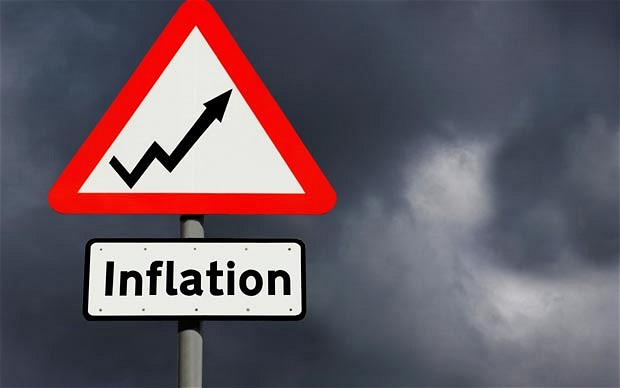This post has already been read 1882 times!
• Prices spike at 13.22%, Buhari, Emefiele see hope
• Imported food tops with 17.3% rate
• Food inflation worst in Kogi, Kwara, Edo
• CBN blames VAT regime, border closure
Nigeria’s inflation rate broke a 29-month moving average to hit 13.22 percent as at the end of last month. This was contained in the Consumer Price Index (CPI) released by the National Bureau of Statistics (NBS) yesterday.
According to the CPI, which measures prices of goods and services, the 13.22 percent is 0.40 percent points higher than the 12.82 percent recorded in July.
On a month-on-month basis, the inflation rate increased by 1.34 percent.
The August inflation rate was the highest since April 2018. Year-on-year inflation rate declined from 13.34 percent in March 2018 to 12.48 percent the following month. It had remained between 11 and 13 until last month.
ANALYSIS of data contained in the CPI report shows that the food category recorded 17.3 percent to emerge as the item with the highest price increase in the year. The prices of imported foods increased by 16.6 percent in the period.
In the 12-month period reviewed, none of the items captured by CPI basket – food, imported food, footwear/clothing, transport, health, communication, education, restaurant/hotels, food/non-alcoholic beverage, recreation/culture, furnishings/household equipment/maintenance, housing/water/electricity/gas/other fuel and alcoholic beverage/tobacco/kola experienced decrease in prices (deflation).
According to the report, year-on-year inflation in urban areas moved from 13.40 percent in July to 13.83 percent in August while month-on-month increased from 1.27 percent to 1.40 percent. Year-on-year inflation, in the case of rural areas, increased 12.28 percent in July to 12.65 percent in August. Month-on-month, it also moved up slightly – from 1.23 percent to 1.27 percent.
In August 2020, Kogi, Kwara, Edo and Delta were above the national average in food inflation with 22 percent, 19.1 percent, 19 percent and 17.9 respectively. It was lower than the national average in core northern states such as Gombe, Kano and Bauchi.
REACTING to the new food price hike, President Muhammadu Buhari asked for calm, assuring that prices would trend down soon. Buhari spoke as he declared open the yearly Chartered Institute of Bankers of Nigeria (CIBN) Conference in Abuja. The president was represented by his Minister of Finance, Budget and National Planning, Mrs. Zainab Ahmed.
“Amidst the uncertainty created by the pandemic, we’re confident that the Nigerian economy will bounce back strongly within the near term with the right policy responses to the multidimensional crises,” the President said. “Since we cannot simply wait for things to get better on their own, we have to formulate appropriate policies and implement them steadfastly to address the challenges head on.”
ADDRESSING the conference, the Governor of the Central Bank of Nigeria [CBN], Mr. Godwin Emefiele expressed hope for price moderation, just as he blamed the increase in prices to some fiscal measures adopted recently.
He gave a historical perspective to the inflation trajectory in the country in the beginning of the first quarter of 2020 and response action taken by the apex bank to hedge the trend.
He said: “Inflationary pressure persisted in the first and second half of the year due to several factors.
In addition to the disruption to global and domestic supply chains as a result of COVID-19, inflation was exacerbated by the increase in VAT rate, exchange rate adjustment and seasonal food supply shocks due to the onset of the farming season and other structural bottlenecks.
“Inflation in July 2020 stood at 12.8 percent. We, however, expect inflation to begin to moderate towards the end of the fourth quarter, as we approach the harvest season, along with the phased withdrawal on restrictions of movement and other measures imposed as a result of COVID-19.”
PROFESSOR of Finance and Capital Market at the Nassarawa State University, Uche Uwaleke, said the rise in prices was expected, but that it would trend down by December.
“The uptick in inflation rate in August was expected and will likely continue till the harvest season sets in,” Uwaleke said. “This is particularly so, given the fact that the inflationary pressure is coming more from the food component which increased by as much as 16 per cent.
“ It is not difficult to see where the pressure is coming from. The economy is still reeling from the negative impact of COVID’19 on the food supply chain. This situation is compounded by the border closure, increase in VAT, electricity tariff, stamp duties and upward exchange rate adjustments by the CBN to ease pressure on the market.”
The University teacher also observed that the recent increase in pump price of fuel presented downside risks to inflation, as well as insecurity.
“There is also the insecurity challenge affecting the food belts of the country, and this partly explains the high rate of food inflation, at over 20 per cent, in states like Kogi. I expect the inflation rate to moderate towards the end of Q4 2020 in the wake of the harvest season as well as a likely increase in external reserves following gradual recovery in crude oil price, which helps stabilise exchange rate.
“I also think the COVID’19 interventions by government and the CBN, especially in the Agric value chain will begin to manifest in Q4 2020.The way forward to rein in inflation is for government to tackle insecurity so that farmers can return to their farms and put in place deliberate policy to promote large-scale mechanised Agriculture. This will involve scaling up interventions in Agriculture, including recapitalizing of Development Finance institutions like the Bank of Agriculture,” Prof. Uwaleke advised.



